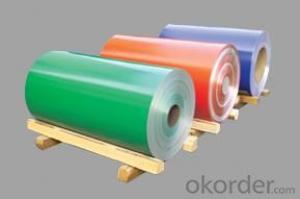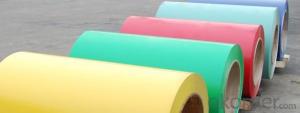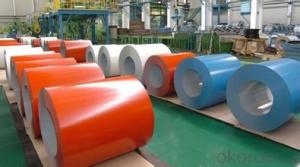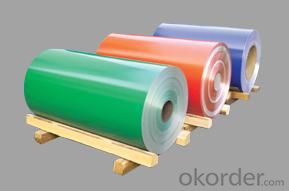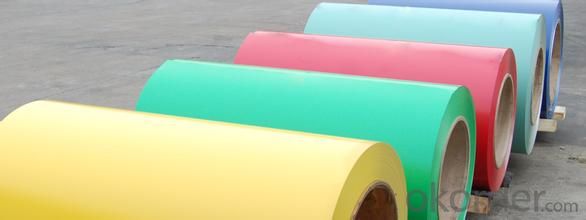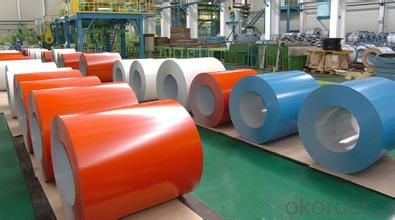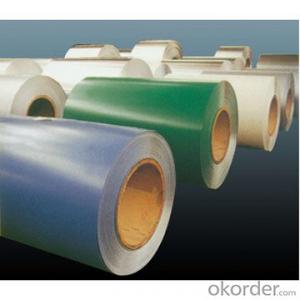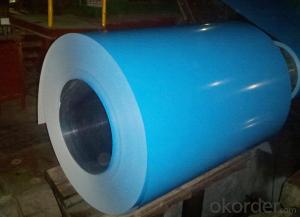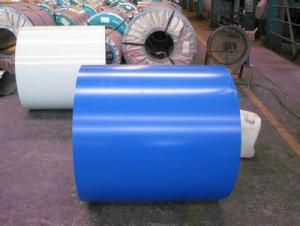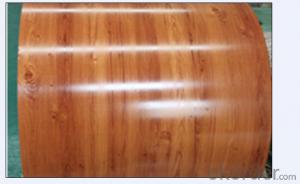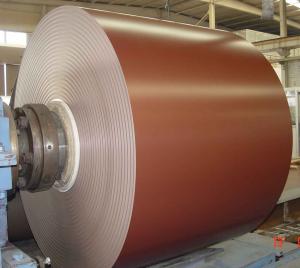Pre-painted aluminum coil in blu
- Loading Port:
- China Main Port
- Payment Terms:
- TT OR LC
- Min Order Qty:
- -
- Supply Capability:
- -
OKorder Service Pledge
OKorder Financial Service
You Might Also Like
Aluminium is a relatively soft,durable, lightweight, ductile and malleablemetalwith appearance ranging from silvery to dull gray, depending on the surfaceroughness. It is nonmagnetic and does not easily ignite. A fresh film ofaluminium serves as a good reflector (approximately 92%) of visible light and an excellent reflector (asmuch as 98%) of medium and far infrared radiation. The yield strengthof pure aluminium is 7–11 MPa, while aluminium alloys have yield strengths ranging from200 MPa to 600 MPa. Aluminium has about one-third the density and stiffness of steel.It is easily machined, cast, drawn and extruded.
Aluminium alloys (or aluminum alloys; see spellingdifferences) are alloysin which aluminium(Al) is the predominant metal. The typical alloying elements are copper, magnesium,manganese,silicon,tin and zinc. There are twoprincipal classifications, namely casting alloys and wrought alloys, both of which are furthersubdivided into the categories heat-treatableand non-heat-treatable. About 85% of aluminium is used for wrought products,for example rolled plate, foils and extrusions.Cast aluminium alloys yield cost-effective products due to the low meltingpoint, although they generally have lower tensile strengthsthan wrought alloys. The most important cast aluminium alloy system is Al–Si,where the high levels of silicon (4.0–13%) contribute to give good castingcharacteristics. Aluminium alloys are widely used in engineering structures andcomponents where light weight or corrosion resistance is required
Secification:
Alloy: AA1050, 1060, 1100, AA3003, 3005, 3015, 5052,5754, 5083,8011, etc
Temper: H14/16/18/22/24/32,HO etc.
Thickness: 0.2mm—100mm
Width: 100mm—2300mm (Can be slitted)
Inner Diameter:508MM
Coil Weight:500kg-3000kg(Max.)
Application:Foil stock, Circles, Roofing, Can stock, Marine plate,Anti-slipery purpose in vehicles, packing and appliance.
Features:
1. Excellent quality of products
2. Quick delivery
3. Best service to clients
4. BV,SGS avalible
5. No buckle o waveness
6. Tension leveling
7. Certificate of Origin
8. Form A,E
Packaging Detail: Carton ,Wooden pallet with plastic protection packing,standard seaworthy packing or as your request.
ProductionCapacity:
AnnualProduction capacity of 600,000 tons.
Products areexported to United States, Canada, U.A.E, Brazil, Mexico,Thailand, Vietnam,Nigeria etc, over 100 countries andregions all over the world.
Coveredfactories with full production line
CNBM aluminumproduction base is comprised of 18 aluminumannealers, 10 coil and foilmills, 4 continuous production lines, 2hot rolling production line and 3prepainted lines.
FAQ:
1. What is the form of payment?
Normally 30% TT, L/C
2. Type of quotation?
FOB, CFR, CIF
3. Port of loading?
Shanghai port
4. Delivery time?
30 day after client’s deposit
- Q: What are the common sizes and thicknesses of aluminum coils?
- The sizes and thicknesses of aluminum coils differ depending on the application and industry. However, there are standard sizes and thicknesses that are commonly utilized across various industries. Regarding size, aluminum coils typically span from approximately 12 to 72 inches in width. This range allows for adaptability in accommodating diverse production processes and equipment. The length of the coils can also vary, but it often falls within the 1000 to 6000 feet range. Concerning thickness, aluminum coils are available in different gauges, typically measured in inches or millimeters. The most frequently employed thicknesses for aluminum coils range from 0.019 inches (0.48 mm) to 0.125 inches (3.18 mm). These thicknesses are suitable for a broad array of applications, including roofing, construction, automotive, and manufacturing. It is important to note that these are general guidelines, and the specific requirements for size and thickness may differ depending on the intended use of the aluminum coils. Additionally, custom sizes and thicknesses can also be manufactured to fulfill specific project requirements.
- Q: Can aluminum coils be used in packaging industries?
- Yes, aluminum coils can be used in the packaging industry. Aluminum is a popular choice for packaging materials due to its numerous advantageous properties. It is lightweight, durable, corrosion-resistant, and has excellent thermal conductivity. These qualities make aluminum coils suitable for various packaging applications, such as food and beverage packaging, pharmaceutical packaging, and cosmetic packaging. Additionally, aluminum is highly recyclable, making it an environmentally friendly choice for the packaging industry. Overall, aluminum coils offer excellent performance and versatility, making them a suitable option for packaging industries.
- Q: Which is better - a steel roof or an aluminum roof?
- Steel! SteelMaster steel roofs are Energy Star rated with Galvalume Plus coating and a 30 year warranty. Our steel roofs are custom designed and engineered to meet the loads and codes required for permitting.
- Q: What is the price range of aluminum coils?
- The price range of aluminum coils can vary greatly depending on factors such as the grade and thickness of the aluminum, quantity purchased, and current market conditions. Typically, aluminum coils can range from $1 to $5 per pound.
- Q: They say aluminum can be found in deodorants.And this aluminum is absorbed by the skin and block pores.Does the amount of aluminum affect the rate of how it dries up?
- Al does not have the ability to retain heat for very long. Therefore theroretically, the greater the amount of Al the faster the substance would dry.
- Q: Is it possible to use aluminum coils for storage purposes?
- <p>Yes, aluminum coils can be used for storage, particularly for certain applications. They are often used in HVAC systems and electrical wiring due to their conductivity and flexibility. For general storage, aluminum coils may be suitable for winding and storing cables, wires, or similar materials. However, for storing items that require a specific environment or have weight concerns, it's important to consider the coil's strength and whether it can provide the necessary support and protection. Always ensure that the storage method complies with safety standards and the material's properties.</p>
- Q: What are the acoustic properties of buildings using aluminum coils?
- The acoustic properties of buildings using aluminum coils can be influenced by various factors. Aluminum coils are commonly used in the construction industry for roofing, cladding, and insulation purposes. From an acoustic perspective, these properties can have both positive and negative impacts on the sound transmission within a building. One of the primary acoustic benefits of using aluminum coils is their ability to act as a reflective barrier for sound waves. When properly installed, aluminum coils can help prevent sound from penetrating through walls or ceilings, resulting in a reduction in external noise sources. This can be particularly beneficial in areas with high levels of noise pollution, such as urban environments or near busy roads. Additionally, aluminum coils can contribute to the overall sound insulation of a building. Due to their material properties, they can provide a certain level of soundproofing, especially when combined with other insulation materials. This can help maintain a comfortable and quiet indoor environment, allowing for improved concentration, productivity, and overall well-being of occupants. However, it is important to note that the acoustic properties of buildings using aluminum coils can also have limitations. Aluminum is a lightweight material compared to alternatives like concrete or brick, which means it may not provide as much mass to block sound transmission. Therefore, in situations where high sound insulation is required, additional measures such as double glazing, acoustic seals, or thicker wall constructions may be necessary. Furthermore, the use of aluminum coils can also affect the sound reverberation within a space. Due to their smooth and reflective surface, aluminum coils can potentially cause sound waves to bounce off, leading to increased echo and reverberation time. This can negatively impact speech intelligibility and acoustic comfort, especially in larger open-plan areas or rooms with high ceilings. Overall, while aluminum coils can offer certain acoustic advantages such as sound reflection and insulation, it is important to consider the specific requirements of each building project. Consulting with acoustic engineers or professionals can help ensure that the appropriate measures are taken to optimize the acoustic properties of buildings using aluminum coils, and to address any potential limitations.
- Q: This question asks for a brief overview of the characteristics that define aluminum coil.
- <p>Aluminum coil possesses several key properties: high strength-to-weight ratio, making it lightweight yet strong; excellent corrosion resistance due to its natural oxide layer; good thermal and electrical conductivity, which is beneficial for heat exchangers and electrical applications; high reflectivity, useful in applications like reflective insulation; and good formability, allowing it to be easily shaped and bent. It's also non-magnetic and has low thermal expansion, which is advantageous in precision applications. Additionally, aluminum coil is recyclable and environmentally friendly, contributing to its popularity in various industries.</p>
- Q: How are aluminum coils used in the manufacturing of appliances?
- Aluminum coils find widespread use in the manufacturing of appliances because of their unique properties and versatility. Primarily, they are employed in the production of heat exchangers, which serve as essential components in appliances like refrigerators, air conditioners, and heaters. One of the key advantages of aluminum coils lies in their remarkable thermal conductivity. This attribute enables them to efficiently transfer heat from one area to another, making them an ideal choice for applications involving heat exchange. In appliances, aluminum coils assist in the cooling or heating processes by transferring heat between the refrigerant or coolant and the surrounding air or water. Additionally, aluminum coils offer superior corrosion resistance in comparison to other metals, rendering them highly suitable for appliances that come into contact with moisture or other corrosive substances. This property guarantees the durability and longevity of the appliances, as the coils are less likely to rust or corrode over time. Moreover, the lightweight nature of aluminum coils contributes to the overall efficiency of appliances. It reduces the energy required for transportation and installation, thereby making it a more sustainable option. Furthermore, the lightweight coils allow for more compact designs, maximizing space utilization in appliances. Another advantage of aluminum coils is their malleability. They can be easily shaped and formed into various sizes and configurations, enabling customized designs that cater to specific appliance requirements. This design flexibility empowers manufacturers to create efficient heat exchangers that fit within the limited space available in appliances. In conclusion, the excellent thermal conductivity, corrosion resistance, lightweight nature, and malleability of aluminum coils make them a preferred choice for use in appliances. These properties make them particularly well-suited for heat exchangers, which play a crucial role in appliances requiring efficient cooling or heating processes.
- Q: Are aluminum coils resistant to moisture?
- Yes, aluminum coils are highly resistant to moisture. Aluminum has a natural oxide layer that forms on its surface, which acts as a protective barrier against moisture and prevents corrosion. This makes aluminum coils an excellent choice for applications where exposure to moisture is a concern, such as in HVAC systems or outdoor equipment.
Send your message to us
Pre-painted aluminum coil in blu
- Loading Port:
- China Main Port
- Payment Terms:
- TT OR LC
- Min Order Qty:
- -
- Supply Capability:
- -
OKorder Service Pledge
OKorder Financial Service
Similar products
Hot products
Hot Searches
Related keywords
